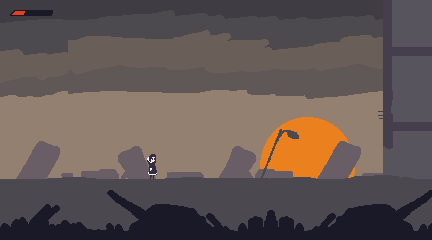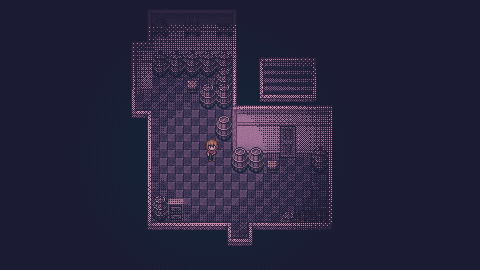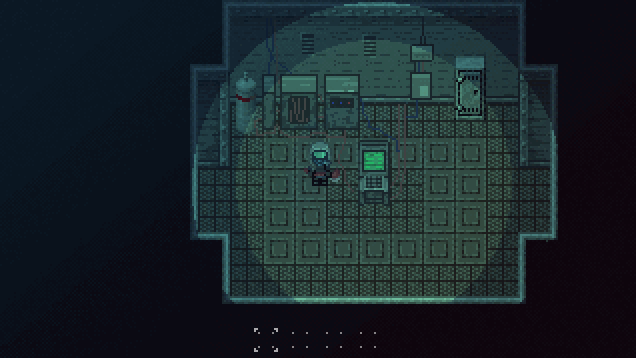Hey no time no blog, I meant to update this semi-regularly but I didn’t want to force myself to do it if I wasn’t into it. Anyhow I got a new ergonomic mechanical keyboard so I suddenly want an excuse to type a lot. Where was I? Oh yeah the start of the machine that BREATHES development.
I found out I was laid off at my animation job sometime in the summer of 2018. Depending on how you phrase it the entire studio was technically out of the job. So I had a month or two to process what I was about to do next. For some reason I immediately started amping my GameMaker learning by taking on several game jams that lead to SEGNO, Nemoral, and Kryopolis. There wasn’t an exact goal with this, just that the days were getting slow leading up to my last day that I decided to focus my energy on solo development. I made tons of game jam games and have even shipped a game onto Steam by this point but this was the first time I had taken up programming and did games on my own.

Made in 2 weeks Segno was a sidescroller that didn't even have gravity. While not interested in making platformers I shifted to a more top down RPG style
I could rewind further and go into the many lofty attempts at RPG Maker projects since 2001, but I think that’s for another blog. What is relevant is that a lot of the momentum in my GameMaker solo projects really benefited from a reliable format from just saying: “Just make it look like an RM game and worry about the gameplay.” Nemoral and Kryopolis used a lot of free to use assets and I already knew how to apply them in a way that made sense. I didn’t get lost in reinventing the wheel on every feature of the game. These were one month projects that resulted in about 30 minutes or so gameplay with a clearly rushed ending.
Without me noticing it, Nemoral and Kryopolis were essentially prototypes of Machine, they were mostly borne out of my desire to go back to the fundamentals of Resident Evil where ammo count was incredibly strict and inventory management affecting exploration as the core of the game. I had only first played REmake for the gamecube around 2015 and I was disappointed to find out that RE2 and onwards somewhat ignored a lot of the survival elements for more action setpieces. Some aspects were still there but I felt the RE series skipped over some good potential when it moved on to RE4’s more crowd pleasing format.

When I say I made RE prototypes they weren’t exactly cutting to the core of what I wanted to explore with Resident Evil. In Nemoral you merely had the goal of killing 8 monsters for the sake of making it a tight game jam game with a focus. Yet in my ideal survival horror: combat is optional. They are obstacles that can be eliminated but for a cost. What I didn’t realize at the time was that this was leading to very messy game design. It is far easier to design a video game where eliminating enemies is the primary goal. So in effect while Nemoral was a good starting point for Machine it was not a proof of concept when it comes to a grander style of game. Of course I had no idea I was going to make Machine at this point.

The takeaway to my future and past self is that if you’re making a “prototype” make sure you’re cutting to the heart of what the game actually is. That is to say, game jam games aren’t really comparable to large or commercial games. They’re great if you’re merely figuring out a format or core gameplay mechanics. Yet in practice it’s really hard to see the game as a whole with the mechanics stretched out over a period of 5-10 hours.
I don’t have a proven solution. One idea would be to take a vertical slice of sorts, repeat that slice several different times until you have a semblance of the start to end. Then really ask yourself if (even in a repetitive state) if this game is enough. Make tweaks to the overall formula rather than addressing every little mechanic and ask yourself is this game manageable. Because once you’re knee deep in the woods of game development it’s really hard to see the forest for the trees. I think the real solution is to really just start out with games with very obvious objectives. To quote one of the Hades developers:
"I think we were ready to just have a game where you fought some dudes." -Amir Rao
Which was in response to the very experimental development phase that Pyre went through. It’s not to say that amazing games like Pyre should be avoided, but designing to answer unclear fuzzy questions comes at a huge development cost. You're essentially stuck on a larger ship that takes longer to steer after having committed to several important decisions. Something that should be considered when investing 3+ years of your life.
Then again it’s also worth asking why pursue such an ambitious long form project in the first place? Stay tuned for my next blog post that will go over that question (hopefully not in several months)